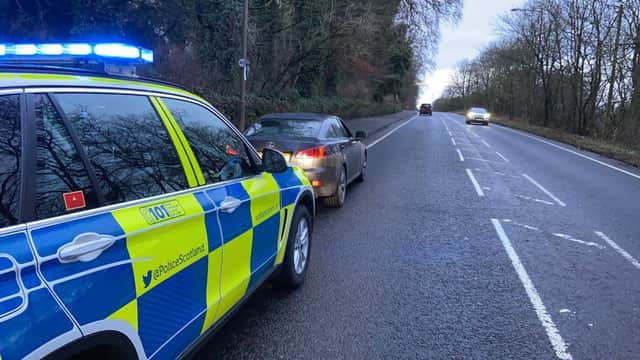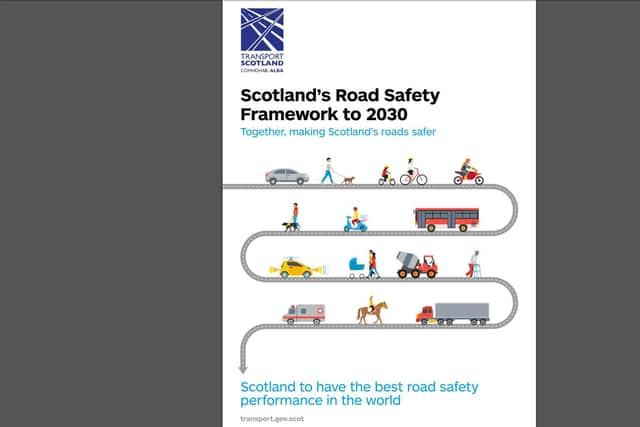Drivers' rethink needed to cut Scotland's death toll to zero - Alastair Dalton


Ministers announced this week they want Scotland to have “the best road safety performance in the world”.
The slogan, proclaimed on the cover of their new blueprint, may be deliberately phrased in such general terms to be achievable on some measure.
Advertisement
Hide AdAdvertisement
Hide AdHowever, it does include the specific and very demanding goals of halving road deaths by 2030 and eliminating them by 2050.


While the total number of casualties may have fallen last year to their lowest level since annual records began in 1950, fatalities have crept up.
Seven more people were killed on Scotland’s roads in 2019, increasing the total to 168.
‘Horrific’
To reduce these preventable deaths is a laudable objective when road crashes are the biggest killer of those between five and 30, and the new strategy,
Scotland’s Road Safety Framework to 2030, admits road safety has been “largely neglected” among child health priorities.
Globally, a horrific 1.35 million people a year die on the roads, more than from HIV/Aids and tuberculosis.
However, the Scottish Government’s ”Vision Zero” target will be incredibly challenging.
IAM RoadSmart, the motoring group with the greatest Scottish expertise, has also pointed out that drink driving and speeding rates, as well as those for deaths, have flatlined over the last decade after previous falls.
Advertisement
Hide AdAdvertisement
Hide AdThe framework agreed that speeding remains a “cultural issue” in Scotland, with more than half of drivers still speeding, a figure which hasn’t reduced for eight years.
Alarm bells
It also highlighted that people don’t see road safety as a major issue compared to murder or knife crime, even though you are three times more likely to be killed in a crash than murdered.
The document pointed out the specific risk to certain drivers, such as the elderly because of their relative frailty, which is getting worse.
It sounded alarm bells too over the increasing use of vans and private cars for work trips, since driving is the most dangerous work activity.
So how will this dramatic reduction be achieved?
A range of measures are proposed but there’s a lot of detail still be filled in, even the framework is only a draft.
They included the design of roads becoming more “forgiving”, so when there is a crash, the consequences for those involved can be reduced.
There’s also talk of more enforcement – and even a random mention of random testing for drink/drug drivers.
The common perception of a lack of police patrols is acknowledged.
‘High-risk pursuit’
Advertisement
Hide AdAdvertisement
Hide AdHowever, while the strategy said road policing should remain a “key priority” for Police Scotland, it seemed to point to shifting part of the job on to the public.
A Welsh scheme which enables people to submit dashboard and helmet camera footage of incidents for use in prosecutions was commended.
There was also mention of the Community Speedwatch initiative, where local people get to wield speed cameras so miscreants can be traced by police.
But fundamentally, we need a change of mindset about using the roads.
Rather than regarding driving as a mundane activity, we should all be constantly reminding ourselves it is actually a high-risk pursuit that still has fatal or life-changing consequences for far too many people.
A message from the Editor:
Thank you for reading this story on our website.
While I have your attention, I also have an important request to make of you.
With the coronavirus lockdown having a major impact on many of our advertisers - and consequently the revenue we receive - we are more reliant than ever on you taking out a digital subscription.
Subscribe to scotsman.com and enjoy unlimited access to Scottish news and information online and on our app.
Advertisement
Hide AdAdvertisement
Hide AdWith a digital subscription, you can read more than five articles, see fewer ads, enjoy faster load times, and get access to exclusive newsletters and content.
Visit https://www.scotsman.com/subscriptions now to sign up.
Our journalism costs money and we rely on advertising, print and digital revenues to help to support them.
By supporting us, we are able to support you in providing trusted, fact-checked content for this website.
Joy Yates
Editorial Director
Comments
Want to join the conversation? Please or to comment on this article.